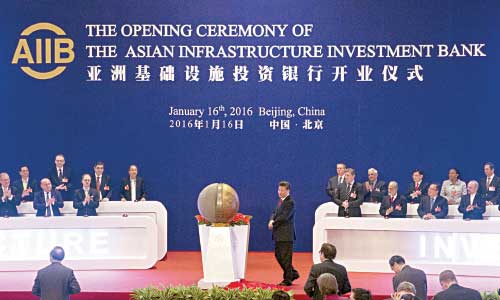AIIB launched
The China-backed Asian Infrastructure Investment Bank in which Bangladesh and 56 other countries have joined as founding members was opened in Beijing on Saturday by China’s president Xi Jinping.
‘This is a historical moment,’ Xi said addressing the ceremony of the bank, which is expected to expand infrastructure financing, rivalling the World Bank and Asian Development Bank, reports Press Trust of India.
A Bangladesh delegation, led by finance minister AMA Muhith, attended the opening ceremony of the AIIB, which has 57 members.
Despite opposition from Washington, US allies including Australia, Britain, German, Italy, the Philippines and South Korea have agreed to join the AIIB in recognition of China’s growing economic clout, reports Reuters.
The bank was formally established in Beijing on December 25, 2015. Chinese finance minister Lou Jiwei was elected as the first chairman of the AIIB council. China’s former finance minister, Jin Liqun was elected the first AIIB president.
With authorised capital of $100 billion and subscribed capital of $50 billion, Beijing-based AIIB will invest in sectors including energy, transportation, urban construction and logistics as well as education and healthcare.
Bangladesh needs to pay $660.50 million as paid-up capital for 0.67 per cent share of the bank, fixed for each founding members on the basis of their gross domestic product. The country, however, has to pay the subscription in five equal yearly instalments of $132.10 million, said state minister for finance and planning MA Mannan earlier.
China, India and Russia are the three largest shareholders, taking a 30.34 per cent, 8.52 per cent, 6.66 per cent stake respectively in the newly formed Bank.
The new Asian Infrastructure Investment Bank will boost investment in the region while contributing to ‘fairer’ global economic governance, Chinese president Xi Jinping said Saturday at the formal opening ceremony in Beijing, reports AFP.
‘The funding and inauguration of the AIIB will effectively boost investment to support infrastructures development in Asia. It will serve to channel more resources, particularly private investment, into infrastructures projects,’ he said.
The US-backed ADB Saturday said it would cooperate closely with the new bank.
‘ADB has started identifying potential cofinancing projects with AIIB in such areas as transport, renewable energy, urban and water,’ it said in a statement.
Earlier this month ADB president Takehiko Nakao said he did not believe the AIIB would diminish his institution, adding the two organisations ‘can complement each other’.
The United States and Japan, respectively the world’s largest and third-largest economies and the principal shareholders in the ADB, have both declined to join the AIIB, part of an initiative by China to expand its financial clout in Asia, amid concerns over the new bank’s governance.
However, Xi on Saturday highlighted measures he said would ensure the AIIB ‘becomes a truly international, rule-based and high standard institution in all aspects, involving its governance structure, operation policy, procurement policy and human resources management’.
Beijing has already sought to expand its influence through Xi’s signature foreign policy initiative, known as ‘One Belt One Road’, a massive investment scheme aims to increase China’s footprint from central Asia to Europe through the use of loans to build infrastructure and transport networks.
Touted as a revival of ancient Silk Road trade routes, the initiative underscores China’s ambition to wield geopolitical power to match its economic might.
Shanghai is also home to a new multilateral bank dedicated to the emerging BRICS countries of Brazil, Russia, India, China and South Africa.
The AIIB will loan $10-15 billion annually, the bank’s chief Jin Liqun said last month.
However, one Philippines-based NGO that monitors development banks — Forum on ADB — raised concerns the AIIB could operate more as a simple lender rather than a development bank.
‘There’s a huge gap in the institutional mechanism,’ executive director Rayyan Hassan told the AFP.
‘I don’t think there has been any face to face dialogue with civil society yet (and) the signs are not good.’
- See more at: http://newagebd.net/194055/aiib-launched/#sthash.zkgtKW5D.dpuf











